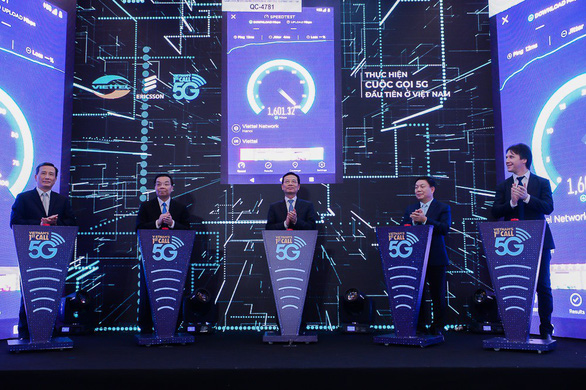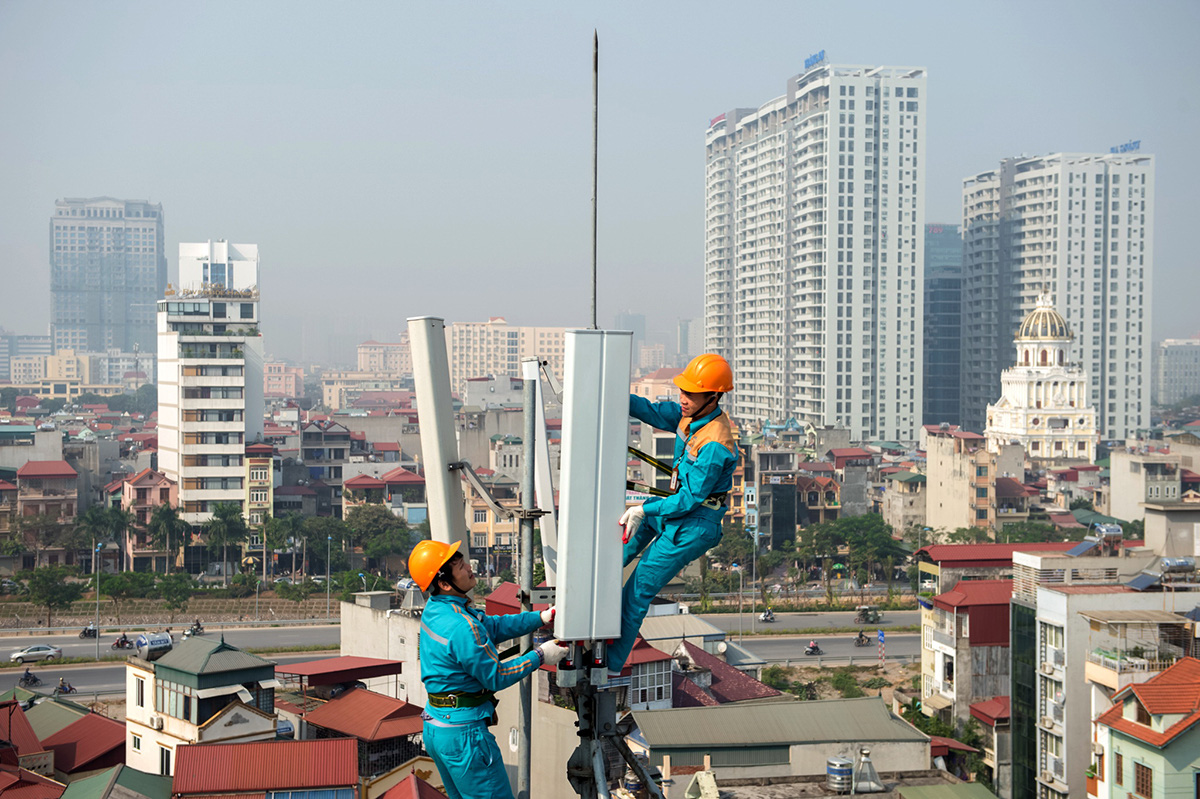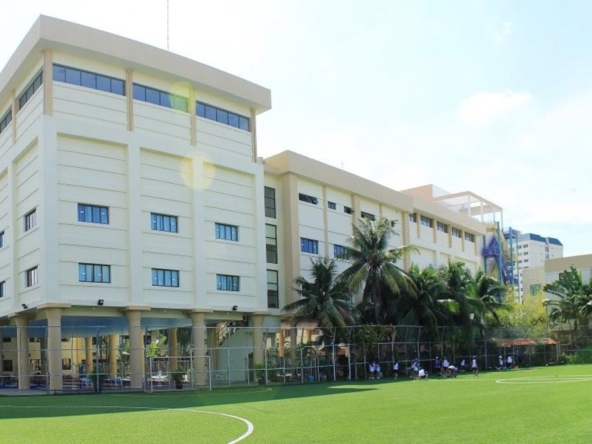Vietnam’s key players in the telecommunications sphere are mobilizing resources to launch their 5G service by the end of 2020

Vietnam’s key players in the telecommunications sphere are mobilizing resources to launch their 5G service by the end of 2020.
The official frequency planning announced by the Ministry of Information and Communications (MIC) on August 20 is considered a giant step forward in Vietnam’s 5G development roadmap.
Considering the current progress, Vietnam might arrive as one of the first countries in the world to successfully roll out the novel telecom standard for commercial use.
5G coverage underway
After several test runs, the military-owned mobile network operator Viettel announced on July 6 they were piloting commercial 5G coverage by launching Viettel-manufactured 5G base stations at the MIC headquarters in Hanoi.
Speed tests showed “download speed reaching 500Mbps [megabits per second] and functioning with stability,” a Viettel representative said.
The telco giant will commercialize 5G microcell technology in October 2020, a delay from the intended launch date of June 2020 due to the impact of COVID-19.
By June 2021, the state-owned telecom will have introduced 5G microcell to its entire network, the representative added.
Specifically, Viettel will develop products of civilian as well as military use on a domestically built “5G ecosystem.”
Catch up with Viettel in the 5G race is the mobile carrier MobiFone, who received the license to deploy 5G communications in April 2019.
The MIC-owned network has also liaised with the world’s top-ranking telecoms equipment suppliers to run technical tryouts in Hanoi, Da Nang, Hai Phong and Ho Chi Minh City.
“The results are promising with download speed recorded at 2Gbps [gigabits per second],” a MobiFone representative revealed.
In March 2020, MobiFone announced its success on the 5G pilot at the four aforementioned cities, which predicated the launch of its nationwide 5G coverage as well as supporting services in the domestic market.
As its 5G test license has been extended to May 2021, MobiFone has been deploying phase 2 of its 5G network tests, focusing on modernizing infrastructure and introducing pilot services to customers.
The group also insinuated its readiness to commercialize 5G service as soon as its official license arrives — tentatively in early 2021.
In April 2020, the state-owned telco Vietnam Posts and Telecommunications Group (VNPT) also announced its successful test runs of 5G on its mobile service provider subsidiary VinaPhone in Hanoi and Ho Chi Minh City.
During the test environment, VinaPhone’s 5G returned an ideal latency rate of near-zero, while its speed fared at 2.2Gbps, a ten-fold improvement from the preceding 4G technology.
This result is the best 5G performance ever recorded among service providers in Vietnam and is coming close to the global 5G standard.
With the successful incorporation of 5G into the current infrastructure, VNPT claimed its preparedness in technical, technological and infrastructural aspects to launch 5G commercially.
 |
| Delegates join a ceremony to launch Vietnam’s first 5G call by telecoms group Viettel in Hanoi, May 10, 2019. Photo: T. Ha / Tuoi Tre |
Harness the power of 5G
On January 17, Minister of Information and Communications Nguyen Manh Hung and Minister of Science and Technology Chu Ngoc Anh made the first 5G video call using gNodeB, a technology infrastructure with both hardware and software aspects developed by Viettel.
The milestone came just eight months after Vietnam’s first 5G call using hardware by a foreign provider.
Despite limitations in the download speed, the achievement helped land the Vietnamese tech giant into the league of 5G network equipment manufacturers alongside the likes of Ericsson, Nokia, Huawei, Samsung and ZTE.
A Viettel representative said the group is aiming to “harness 5G technology and secure a place among the global top-ranking 5G network infrastructure equipment manufacturers.”
“5G base stations produced by Viettel will meet the requirements of all network operators in Vietnam as well as for exports by meeting standards set by the world’s top telecommunications organizations such as 3GPP and GSMA,” he added.
Viettel is prioritizing the research into core technology, accelerating the test processes and collecting user responses to optimize their products in the fastest time possible.
Experts in the sector anticipate self-sufficiency in terms of the 5G infrastructure will render Viettel in a favorable position to kickstart its 5G network and supporting service commercialization.
MobiFone has also entered the 5G facility niche by signing a cooperation deal with Viettel and the Vietnamese smartphone manufacturer VinSmart to contrive research, production and testing on a “make in Vietnam” 5G apparatus.
The telco is also looking to construct an ecosystem with 5G-integrated services and applications with the launch date set in early 2021.
Prospects for customers
Tao Duc Thang, deputy general director of Viettel, said the successful conclusion of 5G connection tests will be followed up by a large-scale 5G rollout in Hanoi and Ho Chi Minh city before the official commercialization in late 2020.
The commercialization will also be divided into phases, with cities of high user density gaining access to the service before remote areas.
Terminal equipment, a category of telecommunications hardware that includes mobile phones, will play a pivotal role in the implementation of this vision.
VinSmart, the two-year-old smartphone manufacturing business of Vietnamese conglomerate Vingroup, introduced its 5G-compatible phone Vsmart Aris in July during the “Make in Vietnam” technology fair organized by the MIC in Hanoi.
Vsmart Aris is the first 5G capable smartphone manufactured in Vietnam. It was used as the test subject during pilot runs of 5G networks by domestic service providers.
VinSmart is also the first Vietnamese firm to be capable of manufacturing 5G terminal equipment, opening up prospects for Vietnamese consumers to get their hands on a 5G device at an affordable price.
According to Vu Hoang Lien, chairman of the Vietnam Internet Association (VIA), 5G holds a predominant advantage to its predecessors in frequency, bandwidth, speed and latency, which guarantees a better user experience.
The improvement in speed and response time will help reduce opportunity costs and enhance efficiency as well as competitiveness for telecommunications services.
5G speed will also open the door for services previously unfeasible in the 4G environment, among which are video-based applications, virtual reality, remote medical and education services, self-driving cars and automatic remote control.
Considering the superior capacity for response time and plural connections, 5G will make ways for the Internet of Things (IoT), automation and robot science applications, he added.
The chairman said he is positive about Vietnam’s readiness for Vietnam in regards of both demand and infrastructure capacity.







